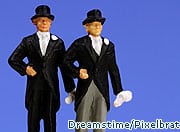A homosexual vicar from north-west London is the first to challenge the Church of England’s (C of E) rules, which strive to uphold traditional marriage amongst its ministers.
Last month the House of Bishops announced that gay C of E clergy would not be allowed to enter same-sex marriages.
Revd Andrew Cain said however, he would not be “frightened” into cancelling his wedding to his partner of 14 years.
Criticism
Clergy would need to “model the Church’s teaching in their lives” and marrying someone of the same sex would be at “variance” with this, the House of Bishops said in a statement.
Rebelling against the Church’s rules may result in defrocking, but Revd Cain says the disciplinary procedure is “complex”.
He said: “They can’t frighten me, the legal procedures for defrocking somebody are extraordinarily complex and expensive and very public”.
Bad
He added that “to try to defrock someone simply for exercising their rights as a United Kingdom citizen would be extraordinarily bad publicity”.
Revd Cain and his partner are hoping to get married this summer, after same-sex laws come into effect on 29 March.
“It has frightened the clergy and some of them have said they are not going to get married, I know that a number of people have left the Church but I also know that a number of us are going to go ahead and deal with the consequences”, he explained.
Rules
Under Church of England rules, those in a civil partnership can become priests and Bishops if they remain celibate.
But Revd Cain chose not to enter a civil union in the hope that he would be able to have a same-sex wedding.
He claims that his intention had never been “to take a stand publicly”.
Special services
Despite the Church’s rules surrounding same-sex marriages for those in holy orders, it has faced criticism for considering offering the public special services to mark gay relationships.
It follows the controversial Pilling Report, released in November and the Bishops have begun a “process of facilitated conversations”.
A letter from the Archbishops of Canterbury and York said the discussions will “include profound reflection on the meaning, interpretation and application of scripture” and will involve “particular attention to the lived experience of lesbian, gay, bisexual and transgendered people”.

